I was distressed a few days ago when someone in a comment thread mockingly referred to recommendations made by a fairly notorious hacker, suggesting that a gray hat wouldn’t give sound advice about personal Internet security.
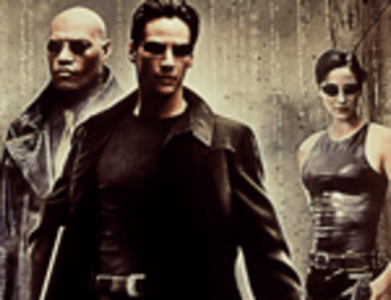
I shook my head for the world of end users to whom hacker is a derogatory term used to describe anyone from malevolent phishers to script kiddies who find themselves on the wrong side of the law. Certainly, I’ve seen hackers pull off feats of questionable legality and dubious utility.
But by and large, the hackers I’ve known and loved have gone on to have brilliant careers in infosec, network administration and even startup-building and application programming. Does the word hacker need a PR facelift? Do we need to educate folks in the real world about what a hacker is and does? What do you think a hacker is, anyway?
I’m fascinated by hacker lore, such as the Jargon File. (Do NOT click that link unless you’ve got a couple hours to kill reading about the earliest days of what would eventually become the Internet. It’s truly enthralling stuff that will have you talking about Usenet heroes in archaic slang for months afterward.) I’m in love with this famous webcomic series about legendary hackers, and I can’t wait to go to DEFCON next year.
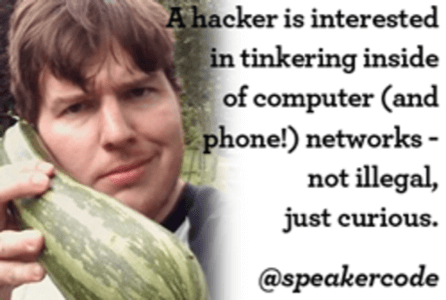
Hackers, it seems to me, do what they do in the name of envelope-pushing and pure curiosity. “What’s this button do?” and “I wonder if I can get in there?” and “How could I make this thing/program perform that action/function?” are the fundamental questions in a hacker-like mind.
Hackers come in all shapes and sizes, and relatively few of them are breaking into your Gmail account or trying to steal your credit card number. There are hardware hackers who will try to make the world’s smallest netbook run Snow Leopard or do dazzling demonstrations with robots or LED displays. There are some hackers who want to expose vulnerabilities in order to build a better firewall or improve network security, and there are hackers who believe strongly in the freedom of information. There are – or were, at least – phone system hackers who figured out how to dial numbers using trinkets in cereal boxes.
These days, we’re seeing more mobile hackers, too. Remember the story about that iPhone hacker who gave the world a RickRoll worm, then got hired for his ingenuity?
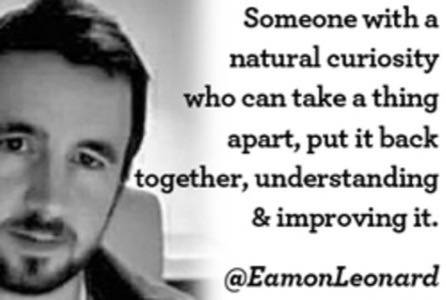
And not least by any means are the hackers who make up a huge chunk of today’s startup community, the young men and women who take all the lovely, big-picture ideas from executives and Photoshop files from UI designers and then work their magic to make it go. I think that’s what makes me particularly indignant: Internet users using technology built by hackers to complain about hackers.
Also, the open-source movement would be completely dead if not for hackers, whose combination of creativity and anti-authoritarianism gave them the ability to stick it to the man and give us all a lot of great free software. Think about that the next time you’re happily pointing and clicking your way through a free web app based on Python and perhaps written by some dude working on a Linux machine.
What’s gone wrong with the world? When did hackers start becoming so misunderstood and under-appreciated? Yes, it’s true that some hackers cross boundaries, both civil and criminal, when pushing their various envelopes. But the true criminals – those who’d run DDoS attacks on social services or steal users’ bank logins – aren’t really what you’d call hackers at all. They’re under-skilled lowlifes, and there are other designations altogether for that type of person. (This is not to downplay the importance of national information security, however, and you might be wrong if you think that hackers do more harm than good for that cause, as well. Exposing vulnerabilities in the networks of our intelligence and military communities is something many white- and gray-hat hackers do routinely, and they do so without selling the information to foreign governments or any such nonsense.)
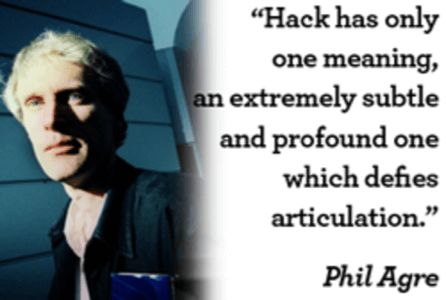
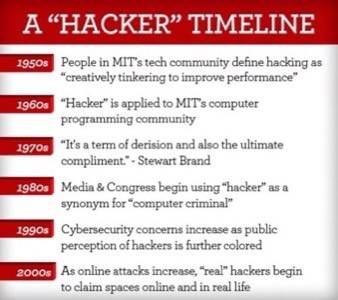
That’s my rather long-winded and subjective definition (and defense) of the term hacker. But let’s hear what you think about it in the comments. Are hackers our heroes? Should they be handsomely compensated for their special brands of magic? Or are they still just digital vigilantes, mischievous at best and criminal at worst?
How do you define the word “hacker”?

















